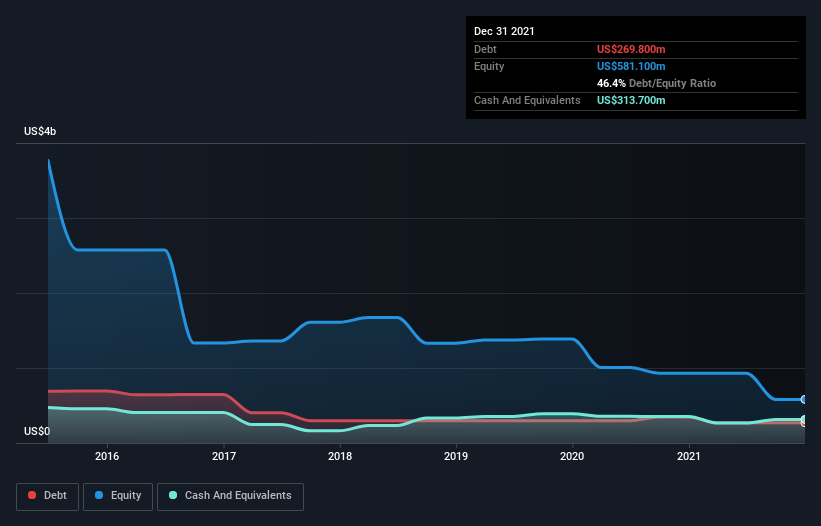Some say volatility, rather than debt, is the best way to think about risk as an investor, but Warren Buffett famously said that 'Volatility is far from synonymous with risk.' When we think about how risky a company is, we always like to look at its use of debt, since debt overload can lead to ruin. As with many other companies Genel Energy plc (LON:GENL) makes use of debt. But is this debt a concern to shareholders?
When Is Debt A Problem?
Debt assists a business until the business has trouble paying it off, either with new capital or with free cash flow. If things get really bad, the lenders can take control of the business. While that is not too common, we often do see indebted companies permanently diluting shareholders because lenders force them to raise capital at a distressed price. Of course, the upside of debt is that it often represents cheap capital, especially when it replaces dilution in a company with the ability to reinvest at high rates of return. When we examine debt levels, we first consider both cash and debt levels, together.
Check out our latest analysis for Genel Energy
How Much Debt Does Genel Energy Carry?
The image below, which you can click on for greater detail, shows that Genel Energy had debt of US$269.8m at the end of December 2021, a reduction from US$348.3m over a year. But on the other hand it also has US$313.7m in cash, leading to a US$43.9m net cash position.

How Strong Is Genel Energy's Balance Sheet?
Zooming in on the latest balance sheet data, we can see that Genel Energy had liabilities of US$104.0m due within 12 months and liabilities of US$331.3m due beyond that. Offsetting these obligations, it had cash of US$313.7m as well as receivables valued at US$145.0m due within 12 months. So it can boast US$23.4m more liquid assets than total liabilities.
This surplus suggests that Genel Energy has a conservative balance sheet, and could probably eliminate its debt without much difficulty. Succinctly put, Genel Energy boasts net cash, so it's fair to say it does not have a heavy debt load! When analysing debt levels, the balance sheet is the obvious place to start. But ultimately the future profitability of the business will decide if Genel Energy can strengthen its balance sheet over time. So if you want to see what the professionals think, you might find this free report on analyst profit forecasts to be interesting.
In the last year Genel Energy wasn't profitable at an EBIT level, but managed to grow its revenue by 110%, to US$335m. So its pretty obvious shareholders are hoping for more growth!
So How Risky Is Genel Energy?
Although Genel Energy had an earnings before interest and tax (EBIT) loss over the last twelve months, it generated positive free cash flow of US$116m. So taking that on face value, and considering the net cash situation, we don't think that the stock is too risky in the near term. We think its revenue growth of 110% is a good sign. We'd see further strong growth as an optimistic indication. The balance sheet is clearly the area to focus on when you are analysing debt. However, not all investment risk resides within the balance sheet - far from it. Case in point: We've spotted 1 warning sign for Genel Energy you should be aware of.
If, after all that, you're more interested in a fast growing company with a rock-solid balance sheet, then check out our list of net cash growth stocks without delay.
New: Manage All Your Stock Portfolios in One Place
We've created the ultimate portfolio companion for stock investors, and it's free.
• Connect an unlimited number of Portfolios and see your total in one currency
• Be alerted to new Warning Signs or Risks via email or mobile
• Track the Fair Value of your stocks
Have feedback on this article? Concerned about the content? Get in touch with us directly. Alternatively, email editorial-team (at) simplywallst.com.
This article by Simply Wall St is general in nature. We provide commentary based on historical data and analyst forecasts only using an unbiased methodology and our articles are not intended to be financial advice. It does not constitute a recommendation to buy or sell any stock, and does not take account of your objectives, or your financial situation. We aim to bring you long-term focused analysis driven by fundamental data. Note that our analysis may not factor in the latest price-sensitive company announcements or qualitative material. Simply Wall St has no position in any stocks mentioned.
About LSE:GENL
Genel Energy
Operates as an independent oil and gas exploration and production company.
Flawless balance sheet with reasonable growth potential.
Similar Companies
Market Insights
Community Narratives



